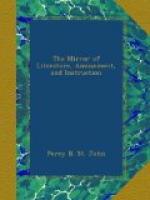Thus, Venice, if no stronger claim were
thine,
Were all thy proud historic deeds forgot,
Thy choral memory of the Bard divine,
Thy love of Tasso, should have cut the
knot
Which ties thee to thy tyrants; and thy
lot
Is shameful to the nations,—most
of all,
Albion! to thee; the Ocean queen should
not
Abandon Ocean’s children; in the
fall
Of Venice think of thine, despite thy
watery wall.
I loved her from my boyhood—she
to me
Was as a fairy city of the heart,
Rising like water-columns from the sea,
Of joy the sojourn, and of wealth the
mart;
And Otway, Radcliffe, Schiller, Shakspeare’s
art
Had stamp’d her image in me, and
even so,
Although I found her thus, we did not
part,
Perchance even dearer in her day of woe
Than when she was a boast, a marvel and
a show.
I can repeople with the past—and
of
The present there is still for eye, and
thought,
And meditation chasten’d down, enough;
And more, it may be, than I hoped or sought;
And of the happiest moments which were
wrought
Within the web of my existence, some
From thee, fair Venice! have their colours
caught:
There are some feelings Time can not benumb,
Nor Torture shake, or mine would now be
cold and dumb.
Again, in the notes to Childe Harold, where these spirit-breathing lines occur:
“The population of Venice, at the end of the 17th century amounted to nearly two hundred thousand souls. At the last census, taken two years ago, it was no more than about one hundred and three thousand, and it diminishes daily. The commerce and the official employments, which were to be the unexhausted source of Venetian grandeur, have both expired. Most of the patrician mansions are deserted, and would gradually disappear, had not the government, alarmed by the demolition of seventy-two, during the last two years, expressly forbidden this sad resource of poverty. Many remnants of the Venetian nobility are now scattered and confounded with the wealthier Jews upon the banks of the Brenta, whose palladian palaces, have sunk, or are sinking, in the general decay. Of the ‘gentil uomo Veneto,’ the name is still known, and that is all. He is but the shadow of his former self, but he is polite and kind. The present race cannot be thought to regret the loss of their aristocratical forms, and too despotic government—they think only on their vanished independence. They pine away at the remembrance, and on this subject suspend for a moment their gay good humour. Venice may be said, in the words of the scripture, ‘to die daily;’ and so general and so apparent is the decline, as to become painful to a stranger, not reconciled to the sight of a whole nation, expiring as it were before his eyes. So artificial a creation having lost that principle which called it into life and supported its existence, must fall to pieces at once, and sink more rapidly than it rose.”




